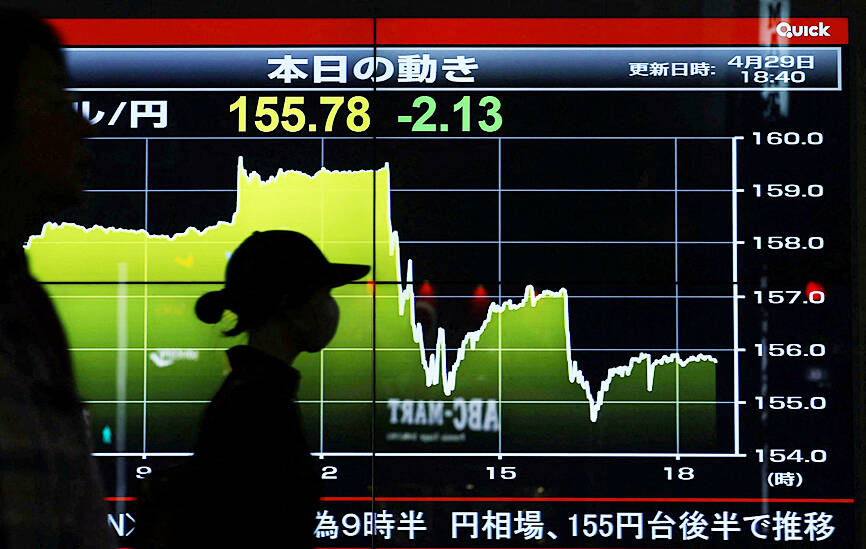The yen jumped sharply against its peers yesterday after it slid past ¥160 per US dollar earlier in the session, with traders citing US dollar-selling intervention by Japanese banks.
The Japanese currency increased about 2 percent from the initial level of ¥159 per US dollar in a matter of a few minutes during Asian trading, as some traders said they had seen the selling of US dollars onshore.
The rapid move came just a few hours after the yen tumbled to the weaker side of ¥160 per US dollar for the first time in 34 years.

Photo: Kyodo via REUTERS
“It does look like intervention,” ING Groep NV currency strategist Francesco Pesole said. “The recipe, hitting that mark of 160, then it looks like a big chunk of intervention delivered at 5am (London time) ... it just makes sense at this point.”
“It’s a very busy week for markets. I suspect that they might have intervened today and then hoped that data in the US and the Federal Reserve does not turn too much favor for the [US] dollar,” he added.
The US dollar was last down 1.59 percent at ¥155.83, after falling to an intraday low of ¥154.54 in early European trading.
“I won’t comment now,” Japanese Vice Minister of Finance for International Affairs Masato Kanda, the nation’s top currency diplomat, said when asked if authorities had intervened.
The Bank of Japan (BOJ) also did not comment on such moves.
A weak yen could be a boon for Japan’s giant exporters such as Toyota Motor Corp, by boosting the value of their overseas earnings when converted into the yen. However, a weak currency could hurt the economy in the long run, because it reduces purchasing power and possible wage growth.
Japan imports almost all its energy.
In equity markets, Taiwan’s TAIEX surged 1.86 percent to 20,495.52 and South Korea’s KOSPI rose 1.2 percent to 2,687.44. Sydney’s S&P/ASX 200 increased 0.8 percent to 7,637.40, Hong Kong’s Hang Seng Index edged up 0.5 percent to 17,746.91, while the Shanghai Composite Index went up 0.8 percent to 3,113.04.
Trading was closed in Tokyo for a holiday, Showa Day. Japan has a series of holidays coming up known as the Golden Week, through Monday next week.
Meanwhile, European stocks and US futures rose, as investors looked toward the US Federal Reserve’s latest decision tomorrow and US jobs data on Friday.
The market mood was positive after last week’s Wall Street tech-driven rally, SPI Asset Management managing partner Stephen Innes said.
The recent string of strong corporate earnings has boosted market sentiment, but what could be a risk factor is the declining Japanese yen, Innes said.
“Investors will be closely monitoring the latest developments in the remarkable and volatile decline of the Japanese yen against the US dollar and other major currencies,” Innes added.
The BOJ’s decision to keep interest rates unchanged on Friday was in line with expectations, but what was unexpected was the central bank’s apparent lack of significant concern about the exchange rate, Innes said.
Additional reporting by AP

Intel Corp chief executive officer Lip-Bu Tan (陳立武) is expected to meet with Taiwanese suppliers next month in conjunction with the opening of the Computex Taipei trade show, supply chain sources said on Monday. The visit, the first for Tan to Taiwan since assuming his new post last month, would be aimed at enhancing Intel’s ties with suppliers in Taiwan as he attempts to help turn around the struggling US chipmaker, the sources said. Tan is to hold a banquet to celebrate Intel’s 40-year presence in Taiwan before Computex opens on May 20 and invite dozens of Taiwanese suppliers to exchange views

Application-specific integrated circuit designer Faraday Technology Corp (智原) yesterday said that although revenue this quarter would decline 30 percent from last quarter, it retained its full-year forecast of revenue growth of 100 percent. The company attributed the quarterly drop to a slowdown in customers’ production of chips using Faraday’s advanced packaging technology. The company is still confident about its revenue growth this year, given its strong “design-win” — or the projects it won to help customers design their chips, Faraday president Steve Wang (王國雍) told an online earnings conference. “The design-win this year is better than we expected. We believe we will win

Chizuko Kimura has become the first female sushi chef in the world to win a Michelin star, fulfilling a promise she made to her dying husband to continue his legacy. The 54-year-old Japanese chef regained the Michelin star her late husband, Shunei Kimura, won three years ago for their Sushi Shunei restaurant in Paris. For Shunei Kimura, the star was a dream come true. However, the joy was short-lived. He died from cancer just three months later in June 2022. He was 65. The following year, the restaurant in the heart of Montmartre lost its star rating. Chizuko Kimura insisted that the new star is still down

While China’s leaders use their economic and political might to fight US President Donald Trump’s trade war “to the end,” its army of social media soldiers are embarking on a more humorous campaign online. Trump’s tariff blitz has seen Washington and Beijing impose eye-watering duties on imports from the other, fanning a standoff between the economic superpowers that has sparked global recession fears and sent markets into a tailspin. Trump says his policy is a response to years of being “ripped off” by other countries and aims to bring manufacturing to the US, forcing companies to employ US workers. However, China’s online warriors